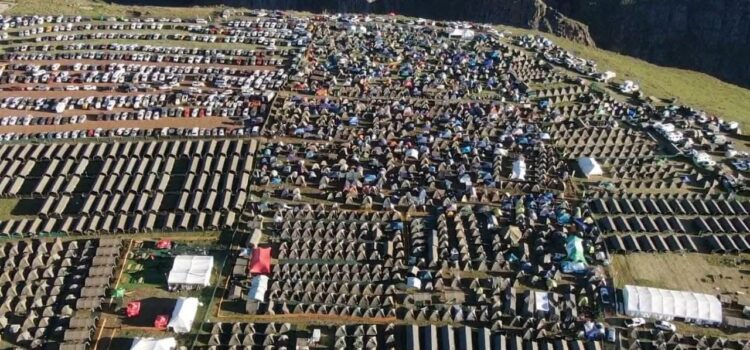On the 8th Edition
The Maletsunyane Braai Festival is a lively and unique event held annually in Lesotho, centered around the celebration of the tradition of braai (barbecue or grilling). It combines the love for food, community gathering, and entertainment, offering an exciting opportunity for botth locals and tourists to come together and experience Lesotho’s culture and hospitality.
The festival typically includes a variety of braai competitions, where participants showcase their culinary skills, often featuring various meats and Lesotho delicacies. It’s not just about food; there is also a strong emphasis on live music performances, local crafts, and family-friendly activities, making it a highly anticipated event in Southern Africa’s events calendar.
In addition to the food and entertainment, the Maletsunyane Braai Festival is hosted in a scenic location, making it attractive for tourists who can enjoy both the festivities and the beauty of the surroundings.
How the Maletsunyane Braai Festival Can Contribute to Lesotho’s Economic Growth
1. Tourism Promotion
The festival attracts tourists from across Southern Africa and the world, contributing to increased tourism revenue. The event can be marketed to international visitors who are interested in unique cultural experiences, food, and beautiful landscapes. Increased visitation during the festival boosts demand for accommodation, transportation, and tour operator services in the Southern Africa region, benefiting local businesses and tourism-related industries.
2. Job Creation
The festival itself creates short-term employment opportunities in various sectors, including event planning, catering, security, transport, and hospitality. As more people visit, it encourages the development of jobs in tourism and related industries like craftsmanship, event coordination, and food services. Additionally, the growth of the festival can create permanent jobs as businesses and services develop around it.
3. Promotion of Local Products and Services
The festival gives local artisans and small businesses a platform to showcase and sell their products, such as crafts, clothing, and food items. This helps promote Lesotho-made goods to a wider audience, encouraging the growth of local industries and supporting sustainable entrepreneurship.
4. Cultural Exchange and Awareness
As the festival becomes more well-known, it serves as a cultural exchange platform that showcases the rich Basotho and Southern African cultures, fostering regional relationships. It creates an opportunity for cultural tourism, where visitors come to not only taste the food but experience the music, dance, and traditional performances. This type of tourism often results in repeat visits and increased recognition of the destination globally.
5. Infrastructure Development
To accommodate the growing number of festival attendees, there are on going improvements in infrastructure such as roads, accommodation facilities, event spaces, and transportation networks. These improvements can have a long-term impact on the community, boosting the area’s capacity to host other events and attracting further investment in tourism and leisure industries.
6. Promoting Agricultural Products
Since braai is heavily centered around grilled meats and vegetables, the festival highlights the role of local agriculture in providing quality ingredients. By promoting locally produced meat, vegetables, and dairy products, the festival increases demand for agricultural goods and encourages growth in the farming sector. It also educates visitors about the sustainable sourcing of food products from local farmers, thus creating an opportunity for agricultural businesses to thrive.
7. Sustainability and Eco-Tourism
With the festival being held in a region known for its natural beauty, the Maletsunyane Falls, the event is structured to align with eco-tourism practices. This encourages responsible tourism and sustainable practices, making the region more attractive to eco-conscious travelers. By highlighting the importance of preserving Lesotho’s natural environments, the festival helps in promoting long-term environmental conservation while growing the economy.
8. Branding Lesotho as a Tourist Destination
The Maletsunyane Braai Festival is an important part of Lesotho’s branding as a tourist destination. As the festival gains international recognition, it not only raises awareness about Lesotho’s culture but also increases interest in visiting the country. If marketed effectively, the festival could serve as a major event on the international tourism calendar, similar to other famous events like the Cape Town International Jazz Festival or the Knysna Oyster Festival or the Bush Fire in Eswatini creating a competitive advantage for Lesotho.
9. Encouraging Investment
As the festival grows and demonstrates economic benefits, it can attract private and public sector investments into tourism, infrastructure, and hospitality. The potential for profit and exposure may inspire local and foreign investors to support new developments, such as luxury accommodations, restaurants, or recreational facilities, fostering further economic diversification.
Conclusion
The Maletsunyane Braai Festival has the potential to become a major driver of economic growth in Lesotho. By capitalizing on the festival’s unique blend of culture, food, tourism, and entertainment, it can create new opportunities for employment, entrepreneurship, and international exposure. With the right strategic planning and investment, this festival can serve as a key catalyst in boosting Lesotho’s tourism sector, generating sustainable income for local communities, and raising the country’s profile on the global tourism stage.
